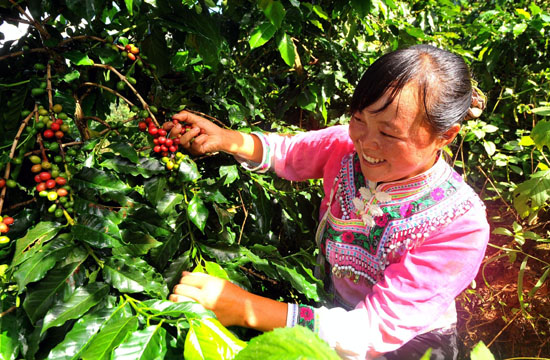|
 |
|
A woman picking beans at a coffee farm in Pu'er, in Southwest China's Yunnan province. Global giants such as Nestle, Starbucks, Kraft Food and Maxwell Coffee are buying coffee beans in Yunnan. [Photo/China Daily] |
Ambitious plan to make the Yunnan crop into a brand known worldwide
Southwest China's Yunnan province, a place renowned for its beautiful old towns, scenery, tea and tobacco, is now creating an image for locally produced coffee.
On a vast coffee farm in Pu'er city, southwestern Yunnan, a total of 36,500 tons of coffee beans is expected to be produced this year with a value of 900 million yuan ($144 million). By 2016, the output will reach 100,000 tons, with an estimated value of 10 billion yuan.
"With increasing production of coffee beans, we hope to make Yunnan coffee available in an increasing number of economies and to have a louder say in bean pricing in the world market," said Hu Lu, vice-president of the Yunnan Coffee Association.
"There is a stereotyped impression among the Chinese that only coffee from the West is authentic," said Liu Minghui, another vice-president of the Yunnan Coffee Association, who also acts as the general manager of AiniCoffee Group, the biggest coffee brand in Yunnan.
Born to a rural family in the mountainous area of Pu'er, Liu's early memory of coffee was the fresh red berries with a citrus taste that he and his young friends would pick as a snack.
When he graduated from college as a major in tropical crops and learned the commercial value of these "berries", he chose to go abroad and sell them to foreigners, rather than doing business in China.
Liu set up his company in New York and created the brand "AiniCoffee" in 1993. "Aini" is the name of the ethnic group that he is from. The pronunciation of ai ni also means "love you" in Chinese.
After 20 years of operation, Liu said he had built AiniCoffee into a popular brand in the United States that wins orders from prestigious coffee trading houses such as Bernhard Rothfos from Germany and Blaser from Switzerland.
After winning a reputation for the beans from his hometown in the West, Liu has now begun to target the Chinese market, which he spurned 20 years ago.
"My experience has proved that Yunnan coffee beans are of good quality and can become the choice of customers, like any other international household brands," he said.
"As Chinese people's idea about coffee evolved over recent years, I think it is now time to inspire them," he said.
Liu and his colleagues are turning this ambition into reality. By operating their own plantation and providing technological support to local farmers, they were able to substantially improve the quality and output of local coffee beans.
Global giants such as Nestle, Starbucks, Kraft Food and Maxwell Coffee are buying coffee beans from their company.
Nestle on Nov 20 offered a purchase price of 17.9 yuan a kilogram for this season's Yunnan coffee beans. The price is the lowest in the past five years.
This situation is largely due to price competition among local coffee traders, said Liu.
The coffee association should interfere and stop the cutthroat competition. More importantly, the priority is to improve the quality of coffee beans in this region because the instant coffee business does not provide good profits, he added.
Several months ago, Starbucks, the world's largest chain of coffee houses, set up a joint venture with AiniCoffee in Pu'er to source quality coffee beans from Yunnan. As a result, Starbucks created its first blend that featured high-quality Arabica coffee beans from China.
Xu Bin, chief executive officer of Creative & Real Food (Shanghai) Co, a coffee and tea trading firm, said coffee beans from Yunnan are popular among Chinese customers. Xu's company is also an online sales agent of AiniCoffee.
"Our company started to sell these coffee beans just a few months ago. Sales keep growing by 20 percent month-by-month," he said.
The total sales of ground Yunnan coffee on Jingdong Mall, Taobao and Amazon, China's largest e-commerce platforms, reach 300 to 500 packs every month. Although the number is not big now, Xu said he is optimistic about the future market, based on the feedback from customers.
"The smell is not as strong as the foreign brands but very special. The texture is fine and smooth, with a flavor of nut and tobacco, which is very pleasant," a customer named Yoyo wrote as a comment on Taobao.
Meanwhile, the biggest advantage of Yunnan beans is their freshness, Xu said.
